If your cat has been using the same litter box for some time then chances are it may stink a bit…even when completely empty.
If this is true for you then keep reading to find out exactly how to clean your cat’s litter box and restore it to its former glory.
Contents
Supplies needed to clean your cat litter box
You won’t need any special tools or equipment to keep your cat’s litter box sparkling clean, fresh, and free of foul-smelling bacteria. Here are a few items that you probably already have around the house:
- Disposable gloves to avoid getting any waste material on your skin
- A rag, sponge, or a small scrub brush that you set aside exclusively for cleaning the cat litter box
- A face mask to help you avoid breathing in airborne germs or litter dust
- (optional) White vinegar, dish soap
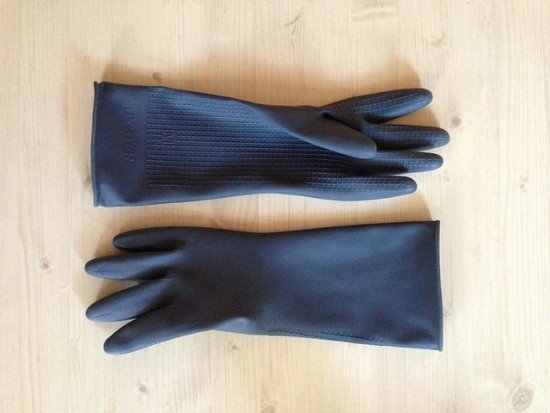
A word of caution: It is strongly recommended that you wear disposable gloves and a face mask when cleaning your cat’s litter box if you are pregnant or for any reason have a compromised immune system.
How to clean a cat litter box:
There is no special science to cleaning your cat’s litter box. It does, however, require a small amount of elbow grease. Here are the five steps to cleaning the litter box:
- Empty the litter box
- Soak the litter box for about 15 minutes. There are several options here. You can:
- Soak it in hot water
- Soak it in hot water with a small amount of dish soap to help loosen any dried matter
- Soak it in 2 or 3 centimeters of white vinegar to help loosen any dried matter
- Scour the litter box with a towel, a small kitchen scrub brush, or a sponge. Always make sure that whichever you choose that you set it aside to use only for cleaning your cat’s litter box.
- Rinse the litter box with warm water to remove any residue
- Dry the litter box with a paper towel or other cleaning towel
Some cat owners prefer to sprinkle a thin layer of baking soda on the bottom of the freshly-cleaned litter box before adding a new batch of fresh cat litter to augment its effectiveness absorbing odours.
This is not usually necessary, especially if you are using kitty litter that clumps.
How often to clean the cat litter box
The best practice is to clean the litter box every time that you change out the cat litter. This is the most effective way to prevent unpleasant odours that may be caused by dirty litter or a persnickety cat that is protesting the condition of their litter box.
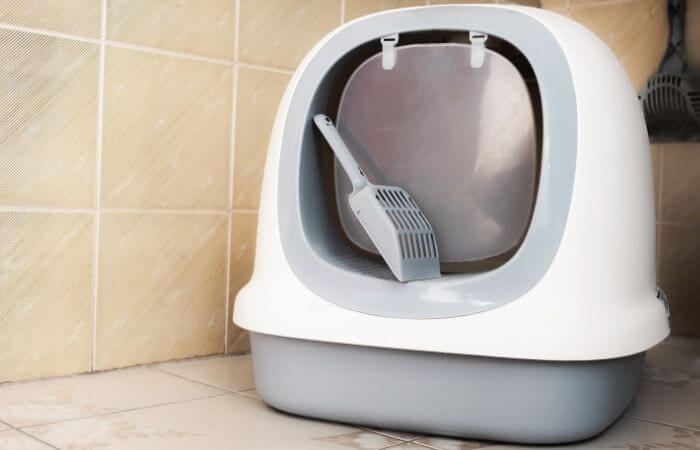
In most cases, if you have one cat using the litter box you should clean the litter box at least once a week. If several cats use the same box, you may have to change the litter and clean the box more frequently.
How often to change the cat litter
There are no hard and fast schedules for changing your cat’s litter. Common sense, observation, and your sense of smell can be your guides.
As a rule of thumb, however, there are two recommended routines that most cat owners adopt:
Daily
You and your cat will appreciate when you remove the waste from the cat litter every day. This is a simple three-step process:
- It is easy to pick up feces and wet litter with a plastic scoop. This task is made easier if you use clumping litter.
- Place the soiled litter in a plastic bag for disposal, and then wash the scoop with disinfectant or bleach and store it in a plastic bag until the next time you use it.
- Replace the litter that you have removed with an equal amount of fresh litter.
You might choose to spread a little baking soda on the surface of the scooped area before adding the fresh litter to help control odours. Others mix a small amount of baking soda with the fresh litter.
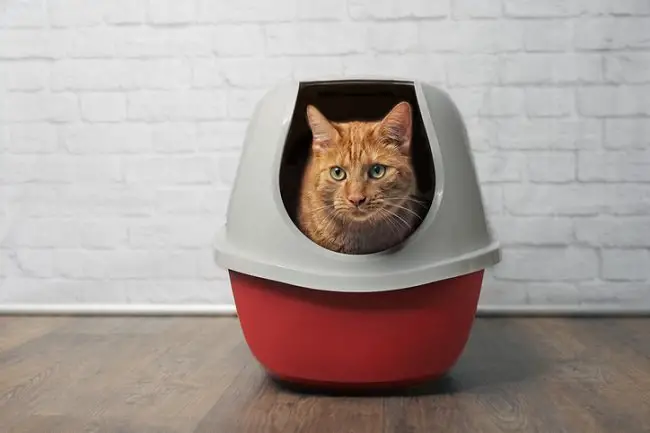
Weekly
If you have one cat, you probably must change its litter once a week. Pay attention, though, because how often you need to change the litter will be influenced by how often your cat uses it and how fussy it is. Your cat may have a strong preference for litter that is cleaner than what other cats prefer.
If you have more than one cat using the same box, you may have to change the litter more frequently.
Hazards of a dirty cat litter box
You should keep your cat litter box clean and its litter fresh for several reasons related to health and quality of life. Here are a few:
Environment
- A dirty litter box can smell offensive. Cat urine emits a powerful odor. Feces isn’t pleasant. You don’t want your home filled with these odours that will be uncomfortable for you and off-putting for your guests.
Top tip, use one of these to help eliminate odours near the litter box:

- Your cat may choose to leave their waste elsewhere in the house if the litter box is dirty. You don’t want to live with that terrible “cat smell” that can be caused by your cat urinating on carpets or furniture when it’s unhappy with the condition of its litter box. It is extremely difficult to remove that smell.
- Dirty litter can increase the risk of health hazards for both cats and humans
Health
There are a number of possible health hazards associated with dirty cat litter boxes and dirty cat litter that can affect your pet and you:
Here are some ways that your cat’s health can be endangered:
- Dirty litter can cause your cat to pick up fungal infections like ringworms or hookworms.
- Cats like to be clean and hygienic. When their litter box is dirty, they shy away from it and may hold in their waste for prolonged periods. This can lead to health issues regarding their bladders and kidneys. These aren’t necessarily fatal, but they can be very expensive to treat.
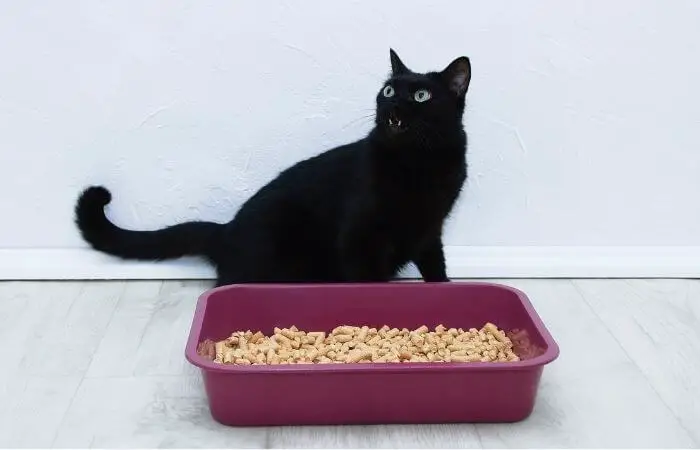
Here are some health hazards that humans can encounter when exposed to dirty cat litter and litter boxes:
- Toxoplasmosis, which can cause fever and sometimes suicidal tendencies
- Salmonella, which can cause diarrhea and stomach cramps
Do’s and Don’ts
Here are some do’s and don’ts regarding how to dispose of dirty cat litter or cleaning your litter box:
Do
- Whether replacing all the litter in the litter box or just the scoops that you’ve removed at the end of the day, place the litter in a plastic bag and seal it tightly.
- Place the plastic bag in an outdoor trash bin to get any escaping odour out of the house.
Don’t
- Don’t flush dirty cat litter or cat feces down the toilet. It can clog your pipes and damage your septic system
- Don’t use bleach, citrus oils, or ammonia to clean your cat litter box because strong fragrances repel cats and will probably cause them to avoid using the box.
As an Amazon Associate I may earn a small fee from qualifying purchases at no extra cost to you. This helps us run the site, so thanks for your support!

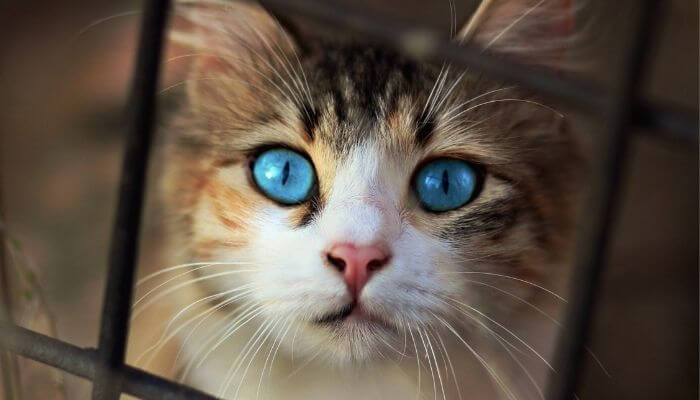
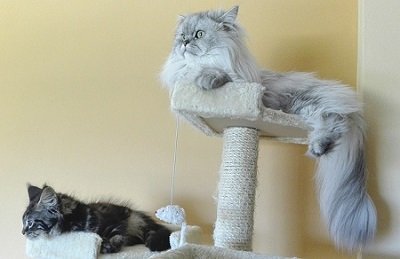
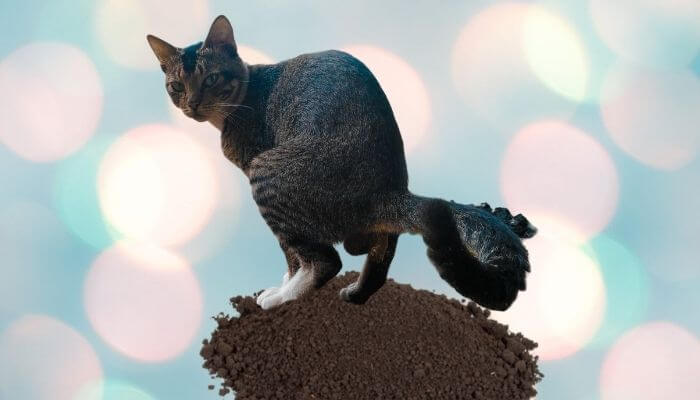
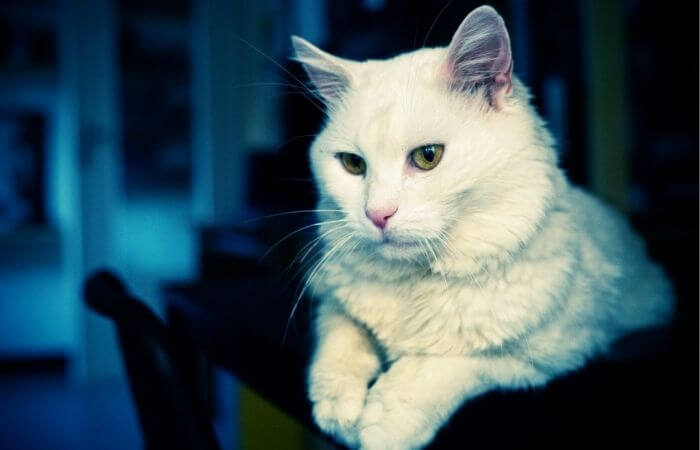
Leave a Comment